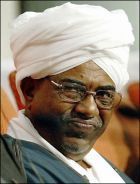Sudanese government stresses weakness to critics abroad
By ELLEN KNICKMEYER, Associated Press Writer
 KHARTOUM, Sudan, Oct 2, 2004 (AP) — At the sleepy spot where the White Nile meets the Blue, mounted loudspeakers blare state-radio paranoia into an almost empty amusement park: Sudan’s enemies are arming Darfur’s rebels. Sudan’s enemies want to overthrow the government.
KHARTOUM, Sudan, Oct 2, 2004 (AP) — At the sleepy spot where the White Nile meets the Blue, mounted loudspeakers blare state-radio paranoia into an almost empty amusement park: Sudan’s enemies are arming Darfur’s rebels. Sudan’s enemies want to overthrow the government.
The Arab-dominated government does indeed have lots of opponents, inside and out, after decades at war with the non-Muslim peoples of its south and now the non-Arab peoples of its west, in Darfur.
But facing threatened international action over alleged genocide in Darfur, Sudan’s leaders are using their enemies and weaknesses as strengths — warning the West that if it brings too much pressure to bear, Africa’s largest nation could easily break apart, erupt in tribal warfare and see a resurgence of the fundamentalists who once let Osama bin Laden make Sudan his home.
Sanctions could lead to heightened tensions between Sudan’s authoritarian capital and rebellious periphery, and those tensions to the collapse of Sudan, Deputy Foreign Minister Najeib el-Abdelwahab said this week, making the jump from U.N. sanctions to failed statehood in one breath.
“The dismemberment of Sudan would really be to the detriment of all Africa, contributing to regional instability and regional insecurity,” Abdelwahab said. “Cementing the unity of Sudan … really would be to the interest of the international community.”
Seldom do all sides in a country refer so casually to its dissolution, as Sudan’s Cabinet ministers, rebel leaders, opposition figures and human rights activists all did this week, publicly and privately.
“Sudan will make democracy, or it will disappear from the world map,” human rights leader Ghazi Suleiman said.
He looked taken aback when asked if he really thought it likely that the country could fall apart.
“Well, I hope not,” he said.
To an extent, the vulnerability is an act for foreign audiences, Sudan’s critics say.
“They say, ‘Look, mess with us, you’ll have another Somalia on your hands … only 10 times the size,”‘ said Eric Reeves, a Smith College professor and leading academic adversary of Sudan.
But the rhetoric is anchored in reality, with Khartoum — resistant to democratic reforms — facing perpetual rebelliousness on its outlands and perpetual coup attempts in its center.
Arab tribes hailing from Sudan’s upper Nile region traditionally have ruled Sudan as their birthright, meting out little power or services to the dozens of other tribes.
As a result, resentments have flourished among peoples literally on the margins of Sudan, a nation of 39 million people seven times the size of Germany.
In south Sudan, a 21-year civil war killed 2 million people in the largely Christian and animist south. Rebels and government signed a deal this year agreeing to power-sharing in principle, although practicalities are to be worked out at talks starting Thursday in Kenya.
World focus now has shifted to Darfur, where politics and small arms have helped turn historic frictions between nomadic Arab cattle-raisers and settled non-Arab farmers into slaughter.
Khartoum is accused of mobilizing warplanes and local Arab tribal fighters after two Darfur rebel groups launched attacks in February 2003.
Allegedly coordinated by the government, bombing runs and horseback raids on non-Arab villages have driven 1.4 million of Darfur’s non-Arab villagers from their homes. More than 50,000 have died.
Darfur’s larger and more active rebel group, the Sudan Liberation Army, is a largely tribal-based movement complaining of neglect by Khartoum.
Smaller but more savvy, the rebel Justice and Equality Movement is seen as tied to Hassan Turabi, an Islamist hard-liner who oversaw Sudan’s transformation into a fundamentalist country after a 1989 coup. Turabi was seen as the true power behind President Omar el-Bashir’s regime until a falling out between the men in the late 1990s.
El-Bashir is now moving Sudan toward the West, with its technology and oil development deals for the petroleum-rich country. Turabi, meanwhile, stews in jail — put there by el-Bashir this year — while his followers plot against his usurpers, the government says.
Turabi’s opposition movement “has very clear footprints in the conflict of Darfur,” said Abdelwahab, the state foreign minister.
It was Turabi who welcomed in Osama bin Laden for four years in the early 1990s, saying later that he considered bin Laden a hero.
El-Bashir’s government plays the fundamentalist card with gusto, insisting Turabi’s followers are working with Darfur’s rebels to overthrow the regime.
But a U.S. diplomat literally shrugged off the idea that weakening al-Bashir’s hand could strengthen Turabi’s, saying he saw no such threat.
According to one international official, at least one influential American has privately warned Darfur’s rebels that Washington has no interest in changing regimes, and that the rebels had better look to negotiations with Khartoum.
Ultimately, opposition politicians say, el-Bashir’s government will have to share power not just with the provinces but in Khartoum itself, building a broader base of political parties.
There’s no sign of such agreement — and few Sudanese expect one.
At the amusement park, deserted of all but veiled women meeting sweethearts by the Niles and a few picnicking mothers and children, no one was listening to the blaring loudspeaker.
“The government’s not serious. They don’t want to solve the problems,” said Hashim Ahmed, a 27-year-old student idling by the pink bunny balloons.
“No one believes it — not in the east, west or south,” Ahmed said, then added of his country: “That’s why I believe it will divide.”
